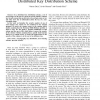Free Online Productivity Tools
i2Speak
i2Symbol
i2OCR
iTex2Img
iWeb2Print
iWeb2Shot
i2Type
iPdf2Split
iPdf2Merge
i2Bopomofo
i2Arabic
i2Style
i2Image
i2PDF
iLatex2Rtf
Sci2ools
131
click to vote
TC
2008
2008
On the Computational Security of a Distributed Key Distribution Scheme
In a distributed key distribution scheme, a set of servers help a set of users in a group to securely obtain a common key. Security means that an adversary who corrupts some servers and some users has no information about the key of a noncorrupted group. In this work we formalize the security analysis of one of such schemes [11], which was not considered in the original proposal. We prove the scheme secure in the random oracle model, assuming that the Decisional Diffie-Hellman problem is hard to solve. We also detail a possible modification of that scheme and the one in [24], which allows to prove the security of the schemes without assuming that a specific hash function behaves as a random oracle. As usual, this improvement in the security of the schemes is at the cost of an efficiency loss.
Related Content
| Added | 15 Dec 2010 |
| Updated | 15 Dec 2010 |
| Type | Journal |
| Year | 2008 |
| Where | TC |
| Authors | Vanesa Daza, Javier Herranz, Germán Sáez |
Comments (0)

